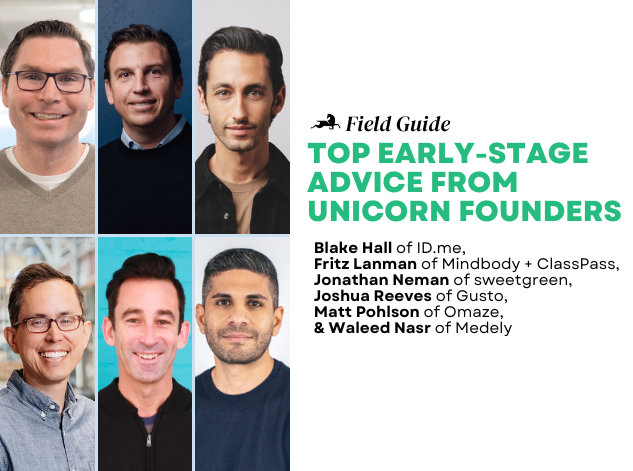Top Early-stage Advice from Unicorn Founders
Posted by: Leila Chreiteh
Posted on 02/27/2024

Posted by: Leila Chreiteh
Posted on 02/27/2024

Building a successful startup requires a founder with exceptional vision, intelligence, character, and execution to navigate the inevitable ups and downs. In the Outlander Unicorn Rodeo Series, we sat down with founders Blake Hall of ID.me, Fritz Lanman of Mindbody & ClassPass, Jonathan Neman of sweetgreen, Josh Reeves of Gusto, Matt Pohlson of Omaze, and Waleed Nasr of Medely to dig into the early strategies of these now-unicorns.
Here’s their advice for founders beginning their startup journey:
1. Conviction is the foundation of startup success: First and foremost, only start a company if you can’t imagine not doing it. Startups require immense resilience and sacrifice that can only be justified by a founder with a greater level of conviction. The most successful founders truly understand and deeply resonate with the problem space they’re trying to solve. Compelled by how their vision will change the future for the better, impact-driven founders are more likely to persevere when things inevitably get tough.
“Don’t do it unless you have to do it—unless you’re just so compelled that it’s not a decision.” — Fritz Lanman of Mindbody & ClassPass
“Companies don’t exist for the sake of it. We exist to fix stuff. It all starts with the problem space. It all starts with something being broken and painful, and you’re so compelled to try to fix that thing that you almost have to start a company to fix it because it’s not getting fixed otherwise.” — Josh Reeves of Gusto
2. Build a complementary, mission-driven team: Identify your strengths and weaknesses as a founder, then seek mentors and team members who augment your capabilities. Beyond complementary skills, your core team must share your conviction and be bought into the vision. Invest in a strong relationship foundation with your team, especially co-founders. Company culture can make or break your long-term success, and hiring a people/HR leader early can enable founders to remain focused on product and sales without sacrificing the top-tier talent needed as the company scales.
“The single most important thing for a first-time founder is to get mentors that help you with your blind spots. Be really cognizant of the archetype that you fit into, and build a founding team that complements but doesn’t duplicate your skill set.” — Blake Hall of ID.me
“Hiring as a search for alignment. You don’t convince someone to join, and they don’t convince you to hire them—it’s both parties figuring out, ‘Can we do something great together and having an intentional approach to that?’, whether it’s the values, motivation, skill, alignment approach, or whatever you create.” — Josh Reeves of Gusto
3. Storytelling is an early-stage founder’s most valuable tool: Your ability to sell your vision is crucial for not only fundraising but also hiring, sales, product development, and beyond. Investors invest in the story, not just the numbers—especially in the early days when experienced VCs know not to expect flashy metrics yet. Likewise, storytelling is critical in mobilizing a team around a shared vision. In the early days, there’ll be less capital to offer potential hires, so founders must sell the vision to attract top talent. The best way to craft a compelling pitch is by going out and pitching over and over, A/B testing your way through it. Similarly, get your hands dirty and personally tackle customer support and product testing challenges. This hands-on approach gives you greater insight into your company, helping you lead and fundraise more effectively.
“The most underrated skill set for an entrepreneur—the one that I would argue might be the most valuable, but people invest the least in—is storytelling. Investors use numbers to fortify the story, but they’re investing in the story.” — Matt Pohlson of Omaze
“If you can’t convince a great engineer to come and work for you and build this thing, you’re going to have a really hard time building a successful company.” — Fritz Lanman of Mindbody & ClassPass
“But for growth-stage investors, when you’re coming up to pre-IPO type level, the story matters 25%. Your numbers matter more than anything. Being to being able to tell the story about your numbers became more important than just the story.” — Waleed Nasr of Medely
4. Prioritize everything against your North Star Metric: Have a deep understanding of your metrics from the early days. Prioritize initiatives that scale your core business and contribute to your North Star Metric (NSM). Start small and remain capital-efficient in the early days by focusing on what advances your value proposition. By staying lean and agile, you can prove your business proposition without over-raising capital and, in turn, raising the bar for your next round or exit.
“Think about what that core business is and make sure you’re investing in what your real value proposition is, not some of the other stuff on the periphery.” — Jonathan Neman of sweetgreen
“The military teaches that you always need to lead two levels down. For me, I’m responsible for the profits and losses (P&L). That’s ultimately what I’m accountable for to my investors and the board. So, in order for me to have confidence that my reports are bringing clarity and focus on what matters, they have to show me that they understand how the different things they do tie back to our P&L and then say, based on this, here are the KPIs that are always true.” — Blake Hall of ID.me
Throughout the Outlander Unicorn Rodeo Series, every founder emphasized the importance of vision, resilience, effective team-building, and alignment with the company’s mission as the cornerstones of successful early-stage startups. Without this foundation, it’s easy for founders to lose the forest for the trees. Unsurprisingly, each founder emphasized the need for a North Star Metric to serve as a compass for all aspects of company building.
However, as Fritz Lanman advised, there’s no substitute for a founder getting their hands dirty, which is why hearing fellow founders’ experiences is often more enlightening than generalized advice. So, we invite you to watch the full firesides with Blake Hall of ID.me, Fritz Lanman of Mindbody and ClassPass, Jonathan Neman of sweetgreen, Josh Reeves of Gusto, Matt Pohlson of Omaze, and Waleed Nasr of Medely to soak up all of their expertise, and save your spot for our upcoming events, too!

Leila is a communications strategist who believes in investing in a better, more progressive future.
As we explore the unknown of each new investment, our Field Guides are where we document all that we learn along the way.
So, whether you’re actively raising, trying to break into VC, or interested in our game-changing portfolio, our Field Guide's got you covered.
Sign up now for exclusive access to funding opportunities, events/resources from our network of experts, updates from our portfolio, and more!